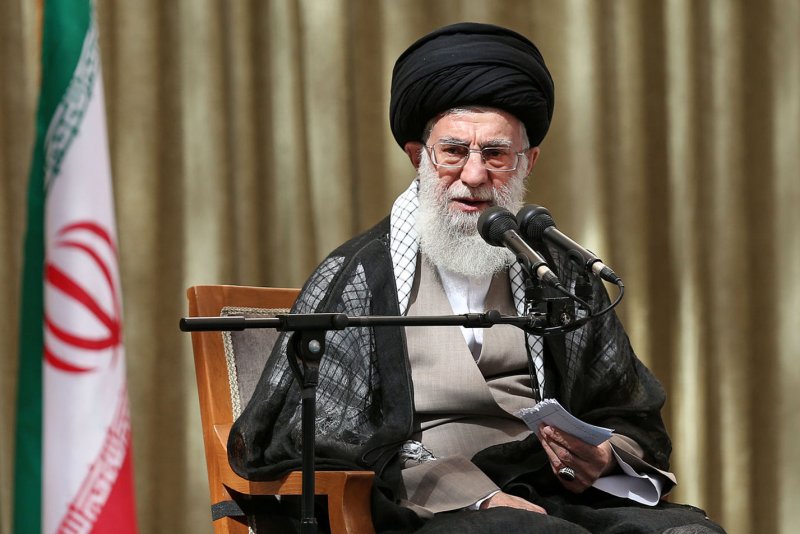Iranian Supreme Leader Ayatollah Khamenei speaks in Tehran, Iran, on June 4, 2014. On Nov. 1, 2015, Khamenei warned foreign countries against deciding Syria's political future, saying it is up to the Syrian people to decide if President Bashar al-Assad, who has for four years faced a bloody insurgency in the mainly Sunni Arab nation, should stay in power. UPI/Leader.ir/HO |
License Photo
TEHRAN, Nov. 1 (UPI) -- Ayatollah Ali Khamenei, the supreme leader of Iran, on Sunday warned foreign countries against deciding the political future of Syria.
"We believe it doesn't make sense that other countries get together and decide about a governing system and the head of that state," The Wall Street Journal quoted Khamenei as saying to Iranian diplomats and government officials. "This is a dangerous initiative which no country in the world would accept to be done for itself."
Iran, along with Russia, has been a key ally to Syrian President Bashar al-Assad. Assad is facing an insurgency from a variety of mainly Sunni Arab militant groups in a bloody four-year civil war that is estimated to have killed more than 250,000 people.
The United States, Turkey, Saudi Arabia and other Sunni powers in the Persian Gulf have supported the anti-Assad opposition, though all of the major actors in the conflict are aligned against the Islamic State, a Sunni terrorist group holding territories in both Syria and Iraq.
Iran and Russia have deployed military forces in support of Assad, and a U.S.-led coalition, which has supported moderate Arab and Kurdish groups, has conducted airstrikes against IS forces in the country for more than a year.
Despite the United States and six other world powers reaching an agreement in July limiting Iran's nuclear program, Khamenei has rejected direct talks with the U.S. negotiators concerning Syria and other regional issues.
However, Iran on Friday joined Russia, the United States and Saudi Arabia -- its regional rival -- for fresh talks over how to negotiate an end to the Syrian conflict.
"The main reason for regional insecurity is the U.S. support for the Zionist regime and terrorist groups, and these policies are 180 degrees different from those of the Islamic Republic," The Wall Street Journal quoted Khamenei as saying, referring in part to the state of Israel, which Iran has long opposed.
U.S. officials have said Assad must be removed as part of a peace accord but recently softened on the issue, saying he could stay as part of a deal that would eventually see him transition from power.
Nations participating in the talks agreed to continue negotiations in the coming weeks.
Khamenei's warning comes as Islamic State forces captured the town of Maheen in Syria's Homs province, bringing the militants within 8 miles of a major highway linking the province to Syria's capital, Damascus.















